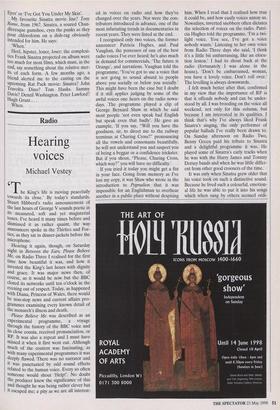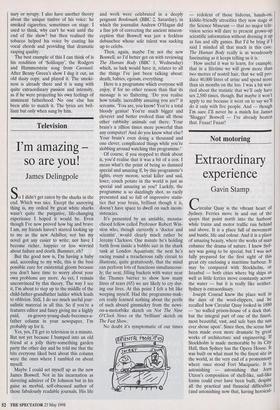Radio
Hearing voices
Michael Vestey
The King's life is moving peacefully towards its close.' By today's standards, Stuart Hibberd's radio announcement of the last hours of George V sounds poetic in its measured, soft and yet magisterial tones. I've heard it many times before and dismissed it as rather quaint, the way announcers spoke in the Thirties and For- ties, as they sat in dinner-jackets before the microphone.
Hearing it again, though, on Saturday night in Between the Ears, Please Believe Me, on Radio Three I realised for the first time how beautiful it was, and how it invested the King's last hours with dignity and grace. It was major news then, of course, as it would be now but the BBC closed its networks until ten o'clock in the evening out of respect. Today, as happened with Diana, Princess of Wales, there would be non-stop news and current affairs pro- grammes examining every known detail of the monarch's illness and death.
Please Believe Me was described as an experimental programme, a voyage through the history of the BBC voice and its close cousin, received pronunciation, or RP. It was also a repeat and I must have missed it when it first went out. Although much of the content was fascinating, as With many experimental programmes it was deeply flawed. There was no narrator and it was punctuated by odd sound effects related to the human voice. Every so often someone would shout 'Help!'. No doubt the producer knew the significance of this and thought he was being rather clever but it escaped me; a pity as we are all interest- ed in voices on radio and how they've changed over the years. Nor were the con- tributors introduced in advance, one of the most infuriating trends in documentaries in recent years. They were listed at the end.
I recognised only two voices, the former announcer Patricia Hughes, and Paul Vaughan, the possessor of one of the best radio voices I've ever heard; he's also much in demand for commercials, 'The future is Orange', and narrations. Vaughan told the programme, 'You've got to use a voice that is not going to sound absurd to people above you socially or below you socially.' This might have been the case but I doubt if it still applies judging by some of the awful voices one hears on the radio nowa- days. The programme played a clip of George Bernard Shaw in which he said most people 'not even speak bad English but speak even that badly'. He gave an example, 'If you say, "Will you have the goodness, sir, to direct me to the railway terminus at Charing Cross?" pronouncing all the vowels and consonants beautifully, he will not understand you and suspect you of being a beggar or a confidence trickster. But if you shout, "Please, Charing Cross, which way?" you will have no difficulty.'
If you tried it today you might get a fist in your face. Going from memory as I've lost my copy, it was Shaw who wrote in the introduction to Pygmalion that it was impossible for an Englishman to overhear another in a public place without despising him. When I read that I realised how true it could be, and how easily voices annoy us. Nowadays, inverted snobbery often dictates the selection of voices on the radio. Patri- cia Hughes told the programme, 'I'm a twi- light voice. You see, I've got a voice nobody wants.' Listening to her own voice from Radio Three days she said, 'I think it's a little bit embarrassing, like an elocu- tion lesson.' I had to shout back at the radio (fortunately I was alone in the house), 'Don't be embarrassed, woman, you have a lovely voice. Don't roll over.' The levelling is always downwards.
I felt much better after that, confirmed in my view that the importance of RP is that it offends nobody and can be under- stood by all. I was brooding on the voice all weekend, not only for this column, but because I am interested in its qualities. I think that's why I've always liked Frank Sinatra's singing, the only performer of popular ballads. I've really been drawn to. On Sunday afternoon on Radio Two, Benny Green paid his tribute to Sinatra and a delightful programme it was. He played some of Sinatra's early tracks when he was with the Harry James and Tommy Dorsey bands and when he was little differ- ent from other good crooners of the time.
It was only when Sinatra grew older that his voice took on such a distinctive sound. Because he lived such a colourful, emotion- al life he was able to put it into his songs which when sung by others seemed ordi- nary or syrupy. I also have another theory about the unique timbre of his voice: he smoked cigarettes, sometimes on stage. I used to think, why can't he wait until the end of the show? but then realised the tobacco helped his voice by coating his vocal chords and providing that dramatic rasping quality.
The best example of this I can think of is his rendition of 'Soliloquy', the Rodgers and Hammerstein song from Carousel. After Benny Green's show I dug it out, an old dusty copy, and played it. The smoki- ness is already there and it is sung with quite extraordinary passion and intensity, as if he were projecting his own feelings of imminent fatherhood. No one else has been able to match it. The lyrics are bril- liant but only when sung by him.



































































 Previous page
Previous page